初中英语语法非谓语动词教案
完整版非谓语动词教案

目录•非谓语动词概述•不定式的用法与功能•动名词的用法与功能•分词的用法与功能•独立主格结构的用法与功能•非谓语动词的注意事项与误区非谓语动词概述定义与作用定义非谓语动词是指在句子中不充当谓语的动词形式。
它们不受主语的人称和数的限制,具有其他词类的特征,可以充当句子的其他成分。
作用非谓语动词能够丰富句子的表达,使句子结构更加紧凑、简洁。
它们可以表示动作、状态、目的、原因等多种语义关系,增加句子的层次感和表达的准确性。
0102 03形式区别非谓语动词有不定式、动名词和分词三种形式,而谓语动词则根据时态、语态、语气等有不同的形式变化。
功能区别非谓语动词在句子中不能单独作谓语,但可以充当主语、宾语、表语、定语、状语等。
而谓语动词是句子的核心,表示主语的动作或状态。
语义区别非谓语动词可以表示动作的过程、结果、目的等,而谓语动词则主要表示动作或状态本身。
非谓语动词与谓语动词的区别非谓语动词的形式与分类不定式由“to + 动词原形”构成,表示动作的过程或目的。
如:to go, to study 等。
动名词由动词+ing构成,表示动作的过程或状态。
如:walking, studying等。
动名词具有名词的性质,可以充当句子的主语、宾语等。
分词包括现在分词和过去分词两种形式。
现在分词由动词+ing构成,表示主动的动作或状态;过去分词由动词+ed构成(不规则动词有特殊的过去分词形式),表示被动的动作或状态。
分词可以充当句子的定语、状语等。
不定式的用法与功能to + 动词原形,如“to do”。
not to + 动词原形,如“not to do”。
to be + 现在分词,表示正在进行的动作,如“to be doing”。
to have + 过去分词,表示动作已经完成,如“to have done”。
基本形式否定形式进行时形式完成时形式不定式的构成与形式表语不定式短语可以作表语,说明主语的性质、特征或状态,如“My job is to teach English.”。
非谓语动词(教案)

非谓语动词一、教学目标:1. 让学生理解非谓语动词的概念和用法。
2. 培养学生正确运用非谓语动词进行句子构建和表达的能力。
3. 提高学生对英语句子结构的认知和运用能力。
二、教学内容:1. 非谓语动词的定义和分类:动词不定式、动名词和分词。
2. 非谓语动词的用法和功能:作主语、宾语、定语、状语等。
3. 非谓语动词在特定句型中的运用:如“have difficulty (in) doing sth.”,“would like to do sth.”等。
三、教学重点与难点:1. 非谓语动词的分类和用法。
2. 非谓语动词在句子中的功能和位置。
3. 非谓语动词在特定句型中的运用。
四、教学方法:1. 实例分析法:通过具体例句讲解非谓语动词的用法。
2. 练习法:设计各种练习题,让学生巩固所学知识。
3. 互动教学法:引导学生参与课堂讨论,提高课堂氛围。
五、教学步骤:1. 引入非谓语动词的概念,让学生初步了解非谓语动词。
2. 讲解非谓语动词的分类:动词不定式、动名词和分词。
3. 通过例句展示非谓语动词的用法和功能。
4. 分析非谓语动词在句子中的位置和作用。
5. 讲解非谓语动词在特定句型中的运用。
6. 设计练习题,让学生巩固所学知识。
7. 课堂互动:引导学生参与讨论,提高学生对非谓语动词的理解。
8. 总结本节课的主要内容,布置课后作业。
六、教学评价:1. 课后作业:要求学生完成一定数量的练习题,巩固本节课所学知识。
2. 课堂练习:观察学生在课堂练习中的表现,了解他们对非谓语动词的掌握程度。
3. 学生互评:鼓励学生之间相互评价,提高课堂互动。
七、课后作业:1. 请用非谓语动词完成下列句子:a. I (do) my homework every day.b. She (go) to the movies with her friends last night.c. He (have) difficulty (in) understanding the lecture.2. 请用非谓语动词改写下列句子,使其更简洁:a. I saw a interesting movie yesterday.b. She is always late for school.八、教学反思:1. 总结本节课的教学效果,反思教学方法的运用。
初中英语语法-非谓语动词教案

初中英语语法-非谓语动词教案一、引言非谓语动词是初中英语语法中的一个重要概念,它是指不具备时态和人称变化的动词形式。
初中阶段的学生在学习和运用非谓语动词时常常会遇到一些困惑和难点。
为了帮助学生更好地掌握非谓语动词的用法和运用,本教案将系统地介绍非谓语动词的分类、形式以及应用,并提供相关的例句和练习,希望能够帮助学生加深对非谓语动词的理解和掌握。
二、非谓语动词的分类非谓语动词可分为三类:不定式、动名词和现在分词/过去分词。
1. 不定式不定式是以to + 动词原形构成的,不表示任何时态和人称的动词形式。
a. 主动形式不定式的主动形式用于表示肯定的、目的性的行为。
例如:•I want to go shopping.(我想去购物。
)•They need to finish their homework.(他们需要完成他们的作业。
)b. 被动形式不定式的被动形式表示被动的、无意识的行为。
例如:•The car needs to be repaired.(这辆车需要被修理。
)•I want to be invited to the party.(我想被邀请参加派对。
)2. 动名词动名词是动词+ing的形式,可以作为主语、宾语、表语、定语和状语。
例如:•Swimming is my favorite sport.(游泳是我最喜欢的运动。
)•She enjoys singing and dancing.(她喜欢唱歌和跳舞。
)•I saw him running in the park.(我看见他在公园里跑步。
)3. 现在分词/过去分词现在分词和过去分词常用于表示主动或被动的、进行或完成的动作。
例如:•The girl carrying a bag is my sister.(提着包的那个女孩是我妹妹。
)•The broken window needs to be replaced.(那扇破窗户需要被替换。
)三、非谓语动词的应用在英语语法中,非谓语动词有着丰富的应用场景。
非谓语教案范文范文
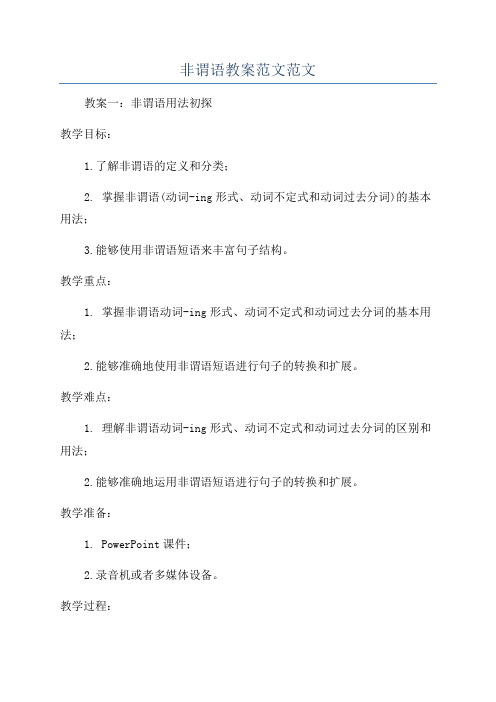
非谓语教案范文范文教案一:非谓语用法初探教学目标:1.了解非谓语的定义和分类;2. 掌握非谓语(动词-ing形式、动词不定式和动词过去分词)的基本用法;3.能够使用非谓语短语来丰富句子结构。
教学重点:1. 掌握非谓语动词-ing形式、动词不定式和动词过去分词的基本用法;2.能够准确地使用非谓语短语进行句子的转换和扩展。
教学难点:1. 理解非谓语动词-ing形式、动词不定式和动词过去分词的区别和用法;2.能够准确地运用非谓语短语进行句子的转换和扩展。
教学准备:1. PowerPoint课件;2.录音机或者多媒体设备。
教学过程:Step 1: 导入1.教师以小组活动的形式向学生展示一张图片,并提问:“请你们看一看这张图片,它是在描述动作还是状态呢?”2.学生讨论后,教师引导他们注意到图片中所展示的是一个动作。
Step 2: 引入1. 教师向学生解释非谓语的定义:“非谓语是指在句子中展示动作、状态和可能性的词组,它可以是动词-ing形式、动词不定式或者动词过去分词。
”2.教师给出非谓语的分类表格,并讲解其中的几个例子,让学生对非谓语形式产生基本的认识。
Step 3: 学习1. 教师使用PowerPoint课件,给学生呈现非谓语的基本用法和例句。
2.学生跟随教师朗读例句,并尝试回答相应的问题。
Step 4: 操练1.学生以小组为单位进行询问和回答练习,使用非谓语短语来扩展和转换句子。
2.学生根据教师给出的提示,编写一段关于自己周末计划的短文,并在短文中使用非谓语短语。
Step 5:总结1.教师和学生共同总结非谓语的用法和特点;2.学生自主完成一道填空练习,巩固非谓语的用法。
Step 6: 达标检测1.教师对学生进行个别测验,检查他们对非谓语的理解和应用能力;2.学生根据老师给出的句子,完成相应的句子改写。
Step 7: 作业布置1.学生完成课堂上没有完成的练习题;2.学生根据教师的要求,编写一篇关于自己的旅行计划的短文,并在短文中使用非谓语短语。
初三非谓语动词讲解教案

初三非谓语动词讲解教案教案教学目标:1. 理解非谓语动词的定义和用法。
2. 掌握非谓语动词的三种形式:动词不定式、动名词和动词-ing 形式。
(to-不定式,-ing 动词形式)3. 能够正确使用非谓语动词来丰富句子结构和表达能力。
教学重难点:1. 非谓语动词的定义和用法。
2. 非谓语动词形式的变化。
3. 注意非谓语动词的逻辑主语与谓语动词的主语之间的关系。
教学准备:1. 教师准备一些例句和相关练习题。
2. 准备一个展示板或黑板。
教学过程:Step 1. 引入非谓语动词的概念(5分钟)教师可通过引入一些有趣的例子,引起学生的兴趣。
例如,小明喜欢游泳,小红喜欢唱歌。
然后问学生“游泳”和“唱歌”是什么词性,表示什么含义。
引导学生认识到“游泳”和“唱歌”不仅可以表示动作,而且可以独立作为名词,这就是非谓语动词。
Step 2. 介绍非谓语动词的三种形式(10分钟)教师在黑板上写下以下三种形式:动词不定式(to-不定式)、动名词和动词-ing 形式,并给出相应的例子进行解释和说明。
动词不定式:动词原形前加“to”,表示动作的未完成、将要发生或被动作所致。
例:to swim, to eat。
动名词:动词的现在分词形式,可以作主语、宾语、表语、定语、宾补等。
例:swimming, eating。
动词-ing 形式:动词的现在分词形式,常作主语、宾语、定语、表语等,表示正在进行的动作。
例:swimming, eating。
Step 3. 练习非谓语动词的形式变化(20分钟)教师给学生一些练习题,要求学生用适当的非谓语动词形式填空,以巩固所学知识。
1. I enjoy _____________ (read) novels.2. She likes _____________ (watch) movies with her friends.3. They are good at _____________ (swim).4. He wants _____________ (go) to the park tomorrow.5. We need _____________ (finish) our homework before dinner.Step 4. 注意非谓语动词的逻辑主语与谓语动词的主语之间的关系。
英语非谓语动词教案

英语非谓语动词经典教案一、教学目标1. 让学生掌握非谓语动词的基本概念和用法。
2. 培养学生正确运用非谓语动词表达句子的能力。
3. 提高学生英语写作和口语表达能力。
二、教学内容1. 非谓语动词的分类:动词不定式、动名词、分词。
2. 非谓语动词的用法和句型结构。
3. 非谓语动词在句子中的功能和作用。
三、教学重点与难点1. 非谓语动词的分类和区别。
2. 非谓语动词的固定搭配和用法。
3. 非谓语动词在复杂句子中的运用。
四、教学方法1. 讲授法:讲解非谓语动词的基本概念、用法和句型结构。
2. 案例分析法:分析典型例句,让学生直观地理解非谓语动词的用法。
3. 练习法:设计各种练习题,让学生巩固所学知识。
4. 互动法:鼓励学生积极参与讨论,提高口语表达能力。
五、教学安排1. 第1-2 课时:讲解非谓语动词的基本概念和分类。
2. 第3-4 课时:讲解非谓语动词的用法和句型结构。
3. 第5-6 课时:分析非谓语动词的固定搭配和用法。
4. 第7-8 课时:讲解非谓语动词在复杂句子中的运用。
5. 第9-10 课时:进行课堂练习和答疑。
6. 第11-12 课时:组织学生进行口语表达和实践。
7. 第13-14 课时:总结非谓语动词的重要知识点。
8. 第15 课时:进行课程复习和测试。
六、教学资源1. 教材:英语非谓语动词相关章节。
2. 课件:制作精美课件,辅助讲解非谓语动词的基本概念、用法和句型结构。
3. 练习题:设计各种练习题,包括选择题、填空题、改错题等,让学生巩固所学知识。
4. 视频资源:寻找相关英语非谓语动词的教学视频,供学生课后自主学习。
七、教学过程1. 导入:通过提问方式引导学生回顾谓语动词的相关知识,为新课的学习做好铺垫。
2. 讲解:详细讲解非谓语动词的基本概念、用法和句型结构,结合典型例句进行分析。
3. 互动:鼓励学生积极参与讨论,提问解答学生在学习过程中遇到的问题。
4. 练习:让学生完成练习题,检测对非谓语动词知识的掌握程度。
非谓语动词教案

非谓语动词教案非谓语动词教案一、教学目标:1. 了解什么是非谓语动词;2. 掌握非谓语动词的基本形式和用法;3. 能够正确使用非谓语动词进行句子构成;4. 培养学生对语法规则的运用能力。
二、教学内容:1. 了解非谓语动词的概念;2. 掌握非谓语动词的种类和形式;3. 学习非谓语动词的基本用法;4. 进行非谓语动词的练习。
三、教学步骤:Step 1:引入1. 教师通过图片和实物引入非谓语动词的概念,引发学生的兴趣;2. 教师向学生解释非谓语动词的定义和作用。
Step 2:知识点讲解与示范1. 非谓语动词的种类和形式:动词不定式、动名词、分词(现在分词、过去分词);2. 非谓语动词的基本用法:a. 动词不定式:用作主语、宾语、表语、定语等;b. 动名词:用作主语、宾语、表语等;c. 现在分词:用作定语、状语等;d. 过去分词:用作定语、表语、补语等;3. 教师通过例句和示范向学生讲解非谓语动词的用法;4. 教师设计一些例题,让学生进行翻译和填空练习,巩固非谓语动词的用法。
Step 3:学生练习1. 学生进行口头和书面的练习,完成一些非谓语动词的句子组织;2. 学生进行小组讨论,互相纠正和改正句子中的错误;3. 学生可以相互出题,让同学们进行回答。
Step 4:讲解与总结1. 教师对学生练习中遇到的问题进行解答;2. 教师对非谓语动词的用法进行总结,强调一些易错点和注意事项;3. 教师进行反馈评价,给予学生鼓励和奖励。
四、教学模式:1. 教师示范与学生练习相结合;2. 教师讲解与学生讨论相结合。
五、教学资源:1. 图片和实物;2. 教师PPT;3. 教材课本;4. 纸笔。
六、教学反思:1. 在设计教学活动时需要注意语言简洁明了,因为非谓语动词的概念和用法对学生来说比较抽象;2. 在讲解过程中需要尽量用简单的例子和语言来解释,帮助学生理解;3. 在练习环节中给予学生足够的时间去完成任务,让学生充分发挥自己的动手能力;4. 在总结阶段需要及时梳理和归纳学生的错误,并及时进行纠正和指导。
非谓语动词教案

非谓语动词一、教学目标与重、难点分析:教学目标:英语动词的基本认识掌握非谓语动词的几种基本形式重、难点:不同形式例如——ing和不定式的区别掌握难度大,而且高考常常出现,还易出错二、授课内容:课题:非谓语动词◆◆【知识梳理】非谓语动词(一)——分词【基本概念】1.对英语动词的基本认识英语中动词的语法作用同汉语区别很大。
动词除了在句子中充当谓语之外,还常以非谓语的形式充当其他的句子成分。
按照动词是否充当谓语,我们可以把动词分为谓语动词和非谓语动词两类。
非谓语动词是指不充当谓语而做其他句子成分的动词,凡是用作非谓语的动词在形式上都要有所变化,以区别于谓语动词。
2.分词的语法作用分词分现在分词和过去分词两类,具有形容词和副词的语法功能,在句子中可以充当表语、定语、状语和宾语补足语。
例1:The news that the Chinese team won the gold medal was very encouraging.句中的现在分词encouraging充当句子的表语。
例2:The people performing all play different instrument.Polluted rivers and lakes have also been a cause of death.现在分词performing作后置定语,修饰the people; 过去分词polluted作定语修饰rivers and lakes。
例3:So he left France, preferring to give up the fortune that would one day come to him, and went to live in English.现在分词短语preferring to give up the fortune that would one day come to him 作状语,表示he left France and went to live in England 的原因。
初中英语语法-非谓语动词教案

初中英语语法-非谓语动词教案初中英语语法-非谓语动词教案一非谓语动词种类及句法功能(一)概述:在英语中,不作句子谓语,但仍具有除谓语外其他语法功能的动词,叫做非谓语动词。
非谓语动词有动词不定式(the Infinitive);动名词(the Gerund);现在分词(the Present Partiiple);过去分词(the Past Partiiple)。
(二)非谓语动词的句法功能1)逻辑主语为了强调是谁发出的一个动作,我们往往要有主语明确表现。
由于非谓语动词在句中不做谓语,所以强调谁发出的动作就不明显。
但它又有动词的某些特征,在这种情况下,就有了其逻辑上的主谓关系。
在英语中,非谓语动词的逻辑主语各有其不同的表现方式,也是常考的一个语法项目,尤其是动名词和分词的逻辑主语。
现在简要分析一下在不定式、动名词和分词中的逻辑主语。
①不定式的逻辑主语是同过介词f 和fr体现的。
这两个介词使用的区别是:当表语是表示主语的性质或特征时(如:gd, nie, ise, generus, flish, lever, sill, rng, stupid, areless, nsiderate, iplite, naught等等),我们使用f; 其它的使用fr。
请看例句:It is unise f the t turn dn the prpsal 他们拒绝这个建议很不明智。
It is generus f u t sta us fr the night 难为你这么慷慨留我们过夜。
It is a great hnr fr us t attend this rall 我们很荣幸参加这个大会。
It is ver dangerus fr hildren t si in the reservir 孩子们在水库里游泳很危险。
②动名词的逻辑主语是在动名词前用名词或代词表现的。
在句首时一般要使用所有格,在句中一般使用其通格。
例如:ar’s grunting ntinuusl anned her husband, and her ther’s staing ith the as the last stra玛丽的不断唠叨已经使她丈夫很烦,她母亲和他们一块住更使他们的关系雪上加霜。
非谓语动词教案范文
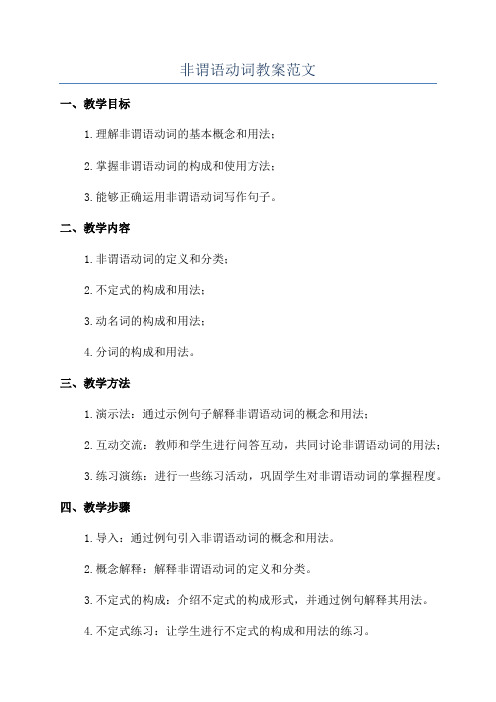
非谓语动词教案范文一、教学目标1.理解非谓语动词的基本概念和用法;2.掌握非谓语动词的构成和使用方法;3.能够正确运用非谓语动词写作句子。
二、教学内容1.非谓语动词的定义和分类;2.不定式的构成和用法;3.动名词的构成和用法;4.分词的构成和用法。
三、教学方法1.演示法:通过示例句子解释非谓语动词的概念和用法;2.互动交流:教师和学生进行问答互动,共同讨论非谓语动词的用法;3.练习演练:进行一些练习活动,巩固学生对非谓语动词的掌握程度。
四、教学步骤1.导入:通过例句引入非谓语动词的概念和用法。
2.概念解释:解释非谓语动词的定义和分类。
3.不定式的构成:介绍不定式的构成形式,并通过例句解释其用法。
4.不定式练习:让学生进行不定式的构成和用法的练习。
5.动名词的构成:介绍动名词的构成形式,并通过例句解释其用法。
6.动名词练习:让学生进行动名词的构成和用法的练习。
7.分词的构成:介绍分词的构成形式,并通过例句解释其用法。
8.分词练习:让学生进行分词的构成和用法的练习。
9.总结归纳:对非谓语动词的构成和用法进行总结归纳。
10.拓展延伸:让学生用非谓语动词写出句子,并进行批评指正。
五、教学评价1.观察学生在课堂上的表现,包括参与度、理解程度和运用能力等;2.对学生的练习作业进行评价,包括正确性、流利度和灵活运用程度等。
六、教学反思通过本节课的设计和实施,学生可以了解到非谓语动词的概念和用法,并能够运用非谓语动词写作句子。
但是,在教学中还可以加入更多的案例和互动活动,以提高学生的学习兴趣和参与度。
(非谓语动词)教案

非谓语动词教案一、教学目标:1. 让学生掌握非谓语动词的概念和用法。
2. 培养学生正确运用非谓语动词进行句子构建和表达的能力。
3. 提高学生对英语语法的理解和运用水平。
二、教学内容:1. 非谓语动词的分类:动词不定式、动名词和分词。
2. 非谓语动词的用法和句型结构。
3. 非谓语动词在句子中的功能和作用。
三、教学重点与难点:1. 重点:非谓语动词的分类、用法和句型结构。
2. 难点:非谓语动词在句子中的功能和作用,以及与主句的逻辑关系。
四、教学方法:1. 采用任务型教学法,让学生在实践中学习和运用非谓语动词。
2. 运用案例分析法,通过具体例句讲解非谓语动词的用法。
3. 采用互动式教学法,鼓励学生积极参与,提高课堂效果。
五、教学过程:1. 引入:通过一个谜语引发学生对非谓语动词的好奇心,如:“What do you calla person who doesn't do anything?(答案:Idler)2. 讲解:a. 非谓语动词的分类及定义b. 非谓语动词的用法和句型结构c. 非谓语动词在句子中的功能和作用3. 练习:a. 填空练习:使用非谓语动词完成句子b. 句子改写:将句子改为使用非谓语动词的形式c. 小组讨论:分析并纠正句子中的非谓语动词错误4. 拓展:介绍非谓语动词在特定语境中的应用,如:固定搭配、被动语态等。
6. 作业布置:a. 抄写并背诵本节课的重点句型b. 完成课后练习册的相关题目c. 搜集含有非谓语动词的例句,进行交流分享六、教学评估:1. 课堂参与度:观察学生在课堂活动中的参与程度,是否积极提问和回答问题。
2. 练习完成情况:检查学生完成练习的情况,包括正确性和完整性。
3. 作业质量:评估学生作业的完成质量,包括语法正确性、表达清晰度等。
4. 小组讨论:观察学生在小组讨论中的表现,包括合作态度、贡献程度等。
七、教学反思:1. 教师应反思教学内容是否清晰易懂,是否需要调整教学进度和难度。
初中英语_非谓语动词教学设计学情分析教材分析课后反思
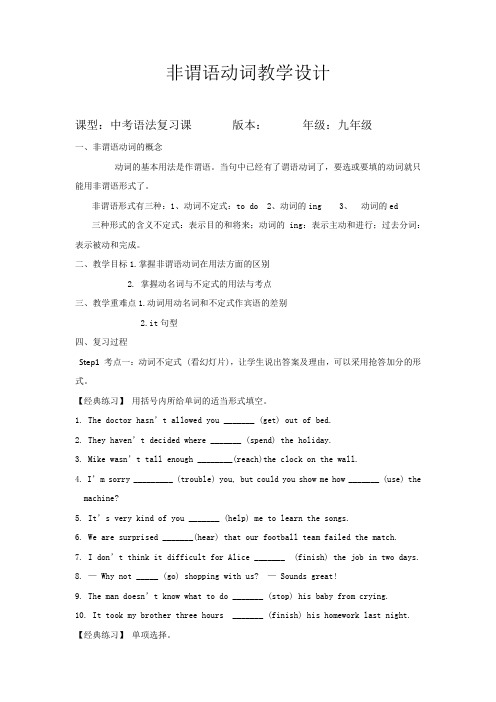
非谓语动词教学设计课型:中考语法复习课版本:年级:九年级一、非谓语动词的概念动词的基本用法是作谓语。
当句中已经有了谓语动词了,要选或要填的动词就只能用非谓语形式了。
非谓语形式有三种:1、动词不定式:to do 2、动词的ing 3、动词的ed三种形式的含义不定式:表示目的和将来;动词的ing:表示主动和进行;过去分词:表示被动和完成。
二、教学目标1.掌握非谓语动词在用法方面的区别2. 掌握动名词与不定式的用法与考点三、教学重难点1.动词用动名词和不定式作宾语的差别2.it句型四、复习过程Step1 考点一:动词不定式 (看幻灯片),让学生说出答案及理由,可以采用抢答加分的形式。
【经典练习】用括号内所给单词的适当形式填空。
1. The doctor hasn’t allowed you _______ (get) out of bed.2. They haven’t decided where _______ (spend) the holiday.3. Mike wasn’t tall enough ________(reach)the clock on the wall.4. I’m sorry _________ (trouble) you, but could you show me how _______ (use) the machine?5. It’s very kind of you _______ (help) me to learn the songs.6. We are surprised _______(hear) that our football team failed the match.7. I don’t think it difficult for Alice _______ (finish) the job in two days.8. — Why not _____ (go) shopping with us? — Sounds great!9. The man doesn’t know what to do _______ (stop) his baby from crying.10. It took my brother three hours _______ (finish) his homework last night. 【经典练习】单项选择。
英语非谓语动词教案

英语非谓语动词经典教案第一章:非谓语动词概述1.1 非谓语动词的定义非谓语动词是指在句子中不充当谓语成分的动词形式。
非谓语动词包括动名词、分词和不定式三种形式。
1.2 非谓语动词的作用非谓语动词在句子中可以作主语、宾语、定语、状语等成分。
非谓语动词可以用来表示动作的进行、状态、结果、原因等。
第二章:动名词2.1 动名词的构成动名词由动词的现在分词形式加上-ing构成。
一些动词在变为动名词时,需要双写词尾字母再加-ing。
2.2 动名词的用法动名词作主语、宾语、定语、状语等成分。
动名词表示一般性动作,可以表示经常性、习惯性的动作。
第三章:分词3.1 分词的构成分词有现在分词和过去分词两种形式。
现在分词由动词的过去分词形式加上-ing构成,过去分词则是由动词的过去分词形式直接构成。
3.2 分词的用法分词作状语时,可以表示时间、原因、条件、方式等。
分词作定语时,可以修饰名词,表示名词的特征或属性。
第四章:不定式4.1 不定式的构成不定式由动词的现在分词形式加上to构成,有时to可以省略。
4.2 不定式的用法不定式作主语、宾语、定语、状语等成分。
不定式表示具体的、一次性的动作,可以表示目的、结果、原因等。
第五章:非谓语动词的辨析与运用5.1 动名词、分词和不定式的区别与联系动名词表示一般性动作,分词表示持续性动作,不定式表示具体性动作。
动名词作主语时表示泛指,分词和不定式作主语时表示特指。
分词作定语时表示名词的特征或属性,不定式作定语时表示名词的具体身份或作用。
5.2 非谓语动词在句子中的运用根据句子的意义和语法结构,选择合适的非谓语动词形式。
注意非谓语动词在句子中的作用和意义,避免混淆和错误使用。
第六章:非谓语动词的时态和语态6.1 非谓语动词的时态非谓语动词的时态变化主要体现在不定式和动名词上。
不定式和动名词都可以使用进行时、完成时和完成进行时态。
6.2 非谓语动词的语态非谓语动词的语态变化主要体现在分词上。
中英语非谓语动词教案及练习

中英语非谓语动词教案及练习一、教学目标:1. 让学生理解英语非谓语动词的概念和用法。
2. 培养学生正确运用非谓语动词表达句子的能力。
3. 提高学生对英语非谓语动词在语境中的认识。
二、教学内容:1. 非谓语动词的分类:动名词、分词、不定式。
2. 非谓语动词的用法和句型结构。
3. 非谓语动词在语境中的表达。
三、教学重点与难点:1. 重点:非谓语动词的分类、用法和句型结构。
2. 难点:非谓语动词在语境中的表达和运用。
四、教学方法:1. 任务型教学法:通过完成具体任务,让学生实践非谓语动词的用法。
2. 情境教学法:创设实际语境,提高学生对非谓语动词的认识。
3. 互动式教学法:引导学生参与课堂讨论,培养学生的思维能力和口语表达能力。
五、教学过程:1. 导入:通过一个谜语引出非谓语动词的概念,激发学生的兴趣。
2. 讲解:讲解非谓语动词的分类、用法和句型结构。
3. 实践:让学生完成一些练习题,巩固所学知识。
4. 情境创设:创设实际语境,让学生运用非谓语动词表达句子。
5. 课堂讨论:引导学生参与讨论,分享彼此的学习心得。
7. 作业布置:布置一些有关非谓语动词的练习题,让学生课后巩固。
六、教学评价:1. 课后作业:评估学生对非谓语动词知识的理解和应用能力。
2. 课堂练习:观察学生在实际语境中运用非谓语动词的准确性和流畅性。
3. 小组讨论:评估学生在讨论中的参与程度和思维能力。
七、教学拓展:1. 非谓语动词在英语语法中的其他应用,如倒装句、强调句等。
2. 非谓语动词在文学作品和日常对话中的典型例句分析。
3. 非谓语动词的翻译技巧和常见错误分析。
八、教学资源:1. 教材:选用适合学生水平的英语教材,提供相关章节内容。
2. 课件:制作清晰的课件,辅助讲解和展示实例。
3. 练习题:准备丰富的练习题,包括选择题、填空题、改错题等。
4. 视频或音频材料:提供非谓语动词在实际语境中使用的视频或音频材料。
九、教学反馈:1. 学生反馈:收集学生对教学内容、教学方法的意见和建议,不断调整教学策略。
初中语法非谓语教案

初中语法非谓语教案教学目标:1. 了解非谓语动词的概念和分类;2. 掌握非谓语动词的用法和语法功能;3. 能够正确选择和使用非谓语动词。
教学内容:1. 非谓语动词的分类和定义;2. 非谓语动词的用法和语法功能;3. 非谓语动词的否定形式和完成式;4. 非谓语动词的复合结构。
教学步骤:一、导入(5分钟)1. 引导学生回顾谓语动词的概念和分类;2. 提问:谓语动词和非谓语动词有什么区别?二、讲解非谓语动词(15分钟)1. 介绍非谓语动词的分类:不定式、动名词和分词;2. 讲解非谓语动词的定义和特点;3. 举例说明非谓语动词的用法和语法功能。
三、非谓语动词的否定形式和完成式(15分钟)1. 讲解非谓语动词的否定形式;2. 讲解非谓语动词的完成式;3. 举例说明非谓语动词的否定形式和完成式的用法。
四、非谓语动词的复合结构(10分钟)1. 讲解非谓语动词的复合结构;2. 举例说明非谓语动词的复合结构的用法。
五、练习(15分钟)1. 布置练习题,让学生巩固所学内容;2. 引导学生互相批改和讨论答案。
六、总结(5分钟)1. 回顾本节课所学内容;2. 强调非谓语动词的重要性和用法。
教学评价:1. 课后作业:布置相关练习题,检查学生掌握情况;2. 课堂表现:观察学生在课堂上的参与度和理解程度。
教学资源:1. PPT课件;2. 练习题;3. 参考资料。
教学建议:1. 在讲解非谓语动词时,结合具体例句和情境,让学生更好地理解和掌握;2. 引导学生多进行练习,巩固所学知识;3. 鼓励学生主动参与课堂讨论,提高课堂氛围。
英语非谓语动词教案

英语非谓语动词经典教案第一章:非谓语动词概述1.1 非谓语动词的概念与分类1.2 非谓语动词与谓语动词的区别1.3 非谓语动词在句子中的作用第二章:不定式2.1 不定式的构成与词性2.2 不定式的基本用法2.3 不定式的特殊用法2.4 含有不定式的复合结构第三章:现在分词3.1 现在分词的构成与词性3.2 现在分词的基本用法3.3 现在分词的独立主格结构3.4 现在分词的否定式第四章:过去分词4.1 过去分词的构成与词性4.2 过去分词的基本用法4.3 过去分词的独立主格结构4.4 过去分词的否定式第五章:非谓语动词的并列结构5.1 非谓语动词并列结构的类型5.2 非谓语动词并列结构的用法5.3 非谓语动词并列结构的注意事项5.4 含有非谓语动词并列结构的经典例句第六章:不定式的特殊句型6.1 不定式短语作主语6.2 不定式短语作宾语6.3 不定式短语作表语6.4 不定式短语作定语和状语第七章:现在分词的进行时态7.1 现在分词进行时态的构成7.2 现在分词进行时态的用法7.3 现在分词进行时态的否定式7.4 现在分词进行时态的疑问句第八章:过去分词的完成时态8.1 过去分词完成时态的构成8.2 过去分词完成时态的用法8.3 过去分词完成时态的否定式8.4 过去分词完成时态的疑问句第九章:非谓语动词的时态和语态9.1 非谓语动词的时态9.2 非谓语动词的语态9.3 非谓语动词的时态和语态的用法9.4 含有非谓语动词的时态和语态的经典例句第十章:非谓语动词在特定句型中的用法10.1 在there be句型中的用法10.2 在it作形式主语句型中的用法10.3 在主语从句中的用法10.4 在宾语从句中的用法第十一章:非谓语动词的翻译技巧11.1 非谓语动词在汉译英中的应用11.2 不定式、现在分词和过去分词在翻译中的区别11.3 非谓语动词长句的翻译策略11.4 非谓语动词在文化差异中的翻译问题第十二章:非谓语动词在写作中的运用12.1 非谓语动词在文章开头的作用12.2 非谓语动词在描述动作流程中的应用12.3 非谓语动词在表达观点和态度中的用法12.4 非谓语动词在写作中的创意运用第十三章:非谓语动词在听力理解中的应用13.1 非谓语动词在口语表达中的特点13.2 如何在听力中识别非谓语动词13.3 非谓语动词在听力理解中的难点13.4 提高听力理解中非谓语动词能力的练习方法第十四章:非谓语动词在口语交流中的实践14.1 非谓语动词在日常对话中的应用14.2 如何在口语交流中正确使用非谓语动词14.3 非谓语动词在口语表达中的注意事项14.4 非谓语动词口语交流的实践练习第十五章:非谓语动词的综合练习与测试15.1 非谓语动词的综合练习题15.2 非谓语动词的测试题型及解题技巧15.3 非谓语动词的模拟测试及答案解析15.4 非谓语动词学习资源的推荐与拓展重点和难点解析本文主要围绕英语非谓语动词展开,涵盖了非谓语动词的基本概念、分类、用法、特殊结构以及在各种语言技能中的应用。
初中语法非谓语动词教学计划
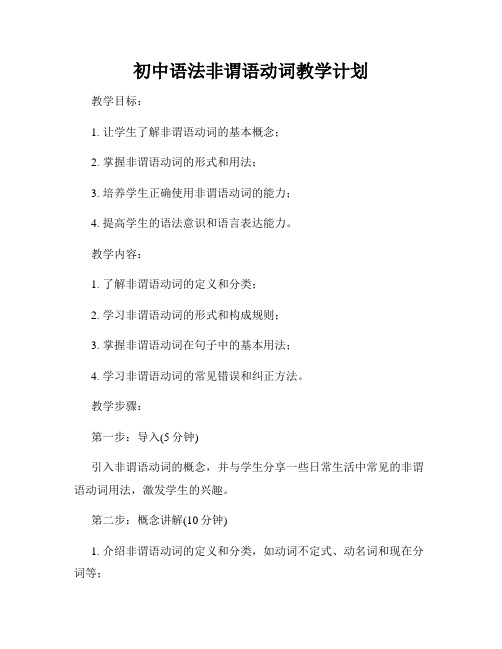
初中语法非谓语动词教学计划教学目标:1. 让学生了解非谓语动词的基本概念;2. 掌握非谓语动词的形式和用法;3. 培养学生正确使用非谓语动词的能力;4. 提高学生的语法意识和语言表达能力。
教学内容:1. 了解非谓语动词的定义和分类;2. 学习非谓语动词的形式和构成规则;3. 掌握非谓语动词在句子中的基本用法;4. 学习非谓语动词的常见错误和纠正方法。
教学步骤:第一步:导入(5分钟)引入非谓语动词的概念,并与学生分享一些日常生活中常见的非谓语动词用法,激发学生的兴趣。
第二步:概念讲解(10分钟)1. 介绍非谓语动词的定义和分类,如动词不定式、动名词和现在分词等;2. 通过实际例子解释非谓语动词的作用和使用场景。
第三步:形式和构成规则(15分钟)1. 分别介绍动词不定式、动名词和现在分词的构成规则;2. 通过练习让学生掌握各种非谓语动词的形式变化。
第四步:基本用法(20分钟)1. 分别讲解动词不定式、动名词和现在分词在句子中作主语、宾语、表语和定语的用法;2. 通过例句分析让学生理解和掌握非谓语动词的基本用法。
第五步:常见错误和纠正方法(15分钟)1. 引导学生发现和纠正常见的非谓语动词错误,如错用形式、搭配不当等;2. 给予学生相关的纠正方法和提示。
第六步:练习与巩固(20分钟)1. 设置不同难度的练习题,让学生对非谓语动词进行灵活运用;2. 通过课堂讨论,让学生互相分享答案和思考过程。
第七步:拓展应用(10分钟)通过学生合作完成一些创意性的小活动,如编写对话、写作文等,巩固和扩展学生对非谓语动词的运用能力。
第八步:总结与反思(5分钟)对本次课的学习内容进行总结,并鼓励学生提出自己的问题和疑惑。
同时,引导学生思考如何在实际语言运用中灵活运用非谓语动词。
教学评价与作业安排:1. 根据学生在课堂上的表现和参与情况进行教学评价;2. 布置相关的练习题和作业,巩固学生对非谓语动词的理解和运用能力。
教学资源准备:1. 教学课件和笔记;2. 练习题和作业;3. 相关的参考资料和学习资源。
九年级英语上册语法《非谓语动词》教学案
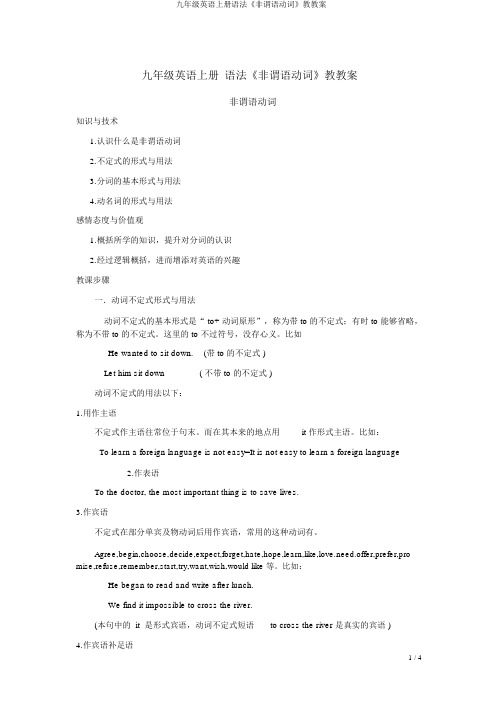
九年级英语上册语法《非谓语动词》教教案非谓语动词知识与技术1.认识什么是非谓语动词2.不定式的形式与用法3.分词的基本形式与用法4.动名词的形式与用法感情态度与价值观1.概括所学的知识,提升对分词的认识2.经过逻辑概括,进而增添对英语的兴趣教课步骤一.动词不定式形式与用法动词不定式的基本形式是“ to+ 动词原形”,称为带 to 的不定式;有时 to 能够省略,称为不带 to 的不定式。
这里的 to 不过符号,没存心义。
比如He wanted to sit down. (带 to 的不定式 )Let him sit down( 不带 to 的不定式 )动词不定式的用法以下:1.用作主语不定式作主语往常位于句末。
而在其本来的地点用it 作形式主语。
比如:To learn a foreign language is not easy=It is not easy to learn a foreign language2.作表语To the doctor, the most important thing is to save lives.3.作宾语不定式在部分单宾及物动词后用作宾语,常用的这种动词有。
Agree,begin,choose,decide,expect,forget,hate,hope,learn,like,love.need.offer,prefer,pro mise,refuse,remember,start,try,want,wish,would like 等。
比如:He began to read and write after lunch.We find it impossible to cross the river.(本句中的 it 是形式宾语,动词不定式短语to cross the river 是真实的宾语 )4.作宾语补足语(A) 在大部分复合宾语及物动词后要用带to 的不定式,这种及物动词常用的有allow,ask,beg,encourage,expect,find,get,hate,help,invite,order,waitfor,tell,want,warm,wish,would like 等。
- 1、下载文档前请自行甄别文档内容的完整性,平台不提供额外的编辑、内容补充、找答案等附加服务。
- 2、"仅部分预览"的文档,不可在线预览部分如存在完整性等问题,可反馈申请退款(可完整预览的文档不适用该条件!)。
- 3、如文档侵犯您的权益,请联系客服反馈,我们会尽快为您处理(人工客服工作时间:9:00-18:30)。
初中英语语法-非谓语动词教案初中英语语法-非谓语动词教案一. 非谓语动词种类及句法功能(一)概述:在英语中,不作句子谓语,但仍具有除谓语外其他语法功能的动词,叫做非谓语动词。
非谓语动词有动词不定式(the Infinitive);动名词(the Gerund);现在分词(the Present Participle);过去分词(the Past Participle)。
(二)非谓语动词的句法功能 1)逻辑主语为了强调是谁发出的一个动作,我们往往要有主语来明确表现。
由于非谓语动词在句中不做谓语,所以强调谁发出的动作就不明显。
但它又有动词的某些特征,在这种情况下,就有了其逻辑上的主谓关系。
在英语中,非谓语动词的逻辑主语各有其不同的表现方式,也是常考的一个语法项目,尤其是动名词和分词的逻辑主语。
现在来简要分析一下在不定式、动名词和分词中的逻辑主语。
① 不定式的逻辑主语是同过介词of 和for来体现的。
这两个介词使用的区别是:当表语是表示主语的性质或特征时(如:good, nice, wise, generous, foolish, clever, silly, wrong, stupid, careless, considerate, impolite, naughty等等),我们使用of; 其它的使用for。
请看例句: It is unwise of them to turn down the proposal. 他们拒绝这个建议很不明智。
It is generous of you to stay us for the night. 难为你这么慷慨留我们过夜。
It is a great honor for us to attend this rally. 我们很荣幸参加这个大会。
It is very dangerous for children to swim in the reservoir. 孩子们在水库里游泳很危险。
② 动名词的逻辑主语是在动名词前用名词或代词来表现的。
在句首时一般要使用所有格,在句中一般使用其通格。
例如:Mary’s grunting continuously annoyed her husband, and her mother’s staying with them was the last straw. 玛丽的不断唠叨已经使她丈夫很烦,她母亲来和他们一块住更使他们的关系雪上加霜。
Xiao Li’s being late for school upset the teacher. 小李的迟到让老师很恼火。
Our sole worry is (you) your relying on youself too much. 我们唯一的担心是你这个人太相信自己了。
They insisted (Xiao Wang) Xiao Wang’s going with them together. 他们坚持要小王和他们一块走。
③ 分词的逻辑主语有两种:一是悬垂分词的逻辑主语,其二是独立主格结构的逻辑主语。
在悬垂结构中,分词的逻辑主语就是主句的主语,如果两者不能构成逻辑上的一致关系则该句结构是错误的.如: Seen from the space, the earth look like a blue ball. 从太空看起来,地球像个兰色的球体。
这个悬垂结构seen from the space = when the earth is seen, … Laughing and chatting, the puples left school for home. 孩子们说说笑笑回家去了。
同上述结构一样,Laughing and chatting = the pupils were laughing and chatting, … 独立主格结构与悬垂结构不同的是独立结构有自己的主语。
这个主语有名词或代词通格来表示,放于分词之前,与分词形成逻辑上的主谓关系。
例如: So many comrades being absent, the meeting had to be put off. 这么多同志都缺席了,所以会议只得延期。
We all went home, he remaining behind. 我们都回家了,只有他留在后面。
Weather permitting, we will go for an outing next week. 如果天气许可,我们下周去郊游。
The class (being) over, the teacher dismissed the students. 下课了,老师把学生打发走了。
The job done, we all went home. 工作完成之后,我们就都回家去了。
With the tree grown tall, we get more shade. 岁着树的不断长高,树阴也越来越浓密了。
Everything taken into consideration, this plan seems to be more feasible. 把一切考虑在内,这个计划看起来可行。
They worked throughout the night with the lamp lighted. 他们挑灯夜战。
2)宾语第一类是有些动词之后面只能使用动名词做宾语。
这些动词有:admit(承认),acknowledge, appreciate(感激), avoid, consider, contemplate, delay, deny, detest, endure, enjoy, excuse, evade, face, finish, facilitate, fancy, favor, forgive, can’t help, imagine, include, involve, mention, mind, miss, postpone, practise, pardon, resent, resist, require, risk, stand, suggest, understand, be worth, feel like, can’t stand, think of, dream of, be fond of, prevent … (from), keep … from, stop …(from, protect … from, set about, be engaged in, spend … (in), succeed in, be used to, look forward to, objectto, pay attention to, insist on, feel like等等。
如: They haven’t finished building the dam. 他们还没有建好大坝。
We have to prevent the air from being polluted. 我们必须阻止空气被污染。
He is considering changing a job. 他正在考虑换个工作。
第二类是既能带动名词又能带不定式作宾语的动词:attempt, begin, cease, continue, dread, forget, hate, intend, like, neglect, omit, prefer, propose, remember, start, try. 具体使用情形请看下述详细解释:① 在begin, start, continue, like, hate, cease等后可以使用两种结构,无有区别。
如: Will you continue gardening/to garden after dinner? 饭后你继续干花园的活,好吗? She likes to be flattered/being flattered. 她喜欢别人奉承她。
② need, want, require, deserve等动词表示“需要,值得”时,有两种结构可以用:一是使用动名词的主动式表被动;二是使用不定式的被动式。
两者没有意义上的区别。
如: The flowers want watering. = The flowers want to be watered. 花该浇水了。
My hair needs cutting. = My hair needs to be cut. 我的头发该理了。
His performance deserves praising. = His performance deserves to be praised. 他的工作应该受到表扬。
③ remember, forget, regret等后面使用动词不定式表示未发生的动作;而使用动名词时表示已经发生的动作。
如: I regret to inform you that we are unable to offer you employment. 我很遗憾地通知你我们无法安排你的就业。
I regret being unable to help you. 我很遗憾当时未能帮你。
Don’t forget to post the letter on your way to work. 别忘了上班的路上把信寄走。
I forget posting the letter you gave me thins morning. 我忘了把你今天早上给我的信发走。
④ try后跟动名词表示“试一试”;和动词不定式连用表示“努力,试图”。
This foreign guest tried writing with the Chinese brush. 这位外国客人试着用毛笔写字。
He tried to cheat the old man out of his money. 他试图骗这老头的钱。
⑤ mean, intend后跟动名词表示“意味着”;接不定式表示“打算”。
如:Today, I intend to finish reading this book. 今天我打算读完这本书。
What he said at the meeting means his going abroad next year. 他在会上说的意思是他要出国。
⑥ prefer后使用动名词还是不定式有这么两种情况:当我们谈论一般情况时和当我们说在两种活动之间更喜欢哪一种的时候,一般使用动名词;另一种是和不定式连用,一般用来引导另一个短语。
